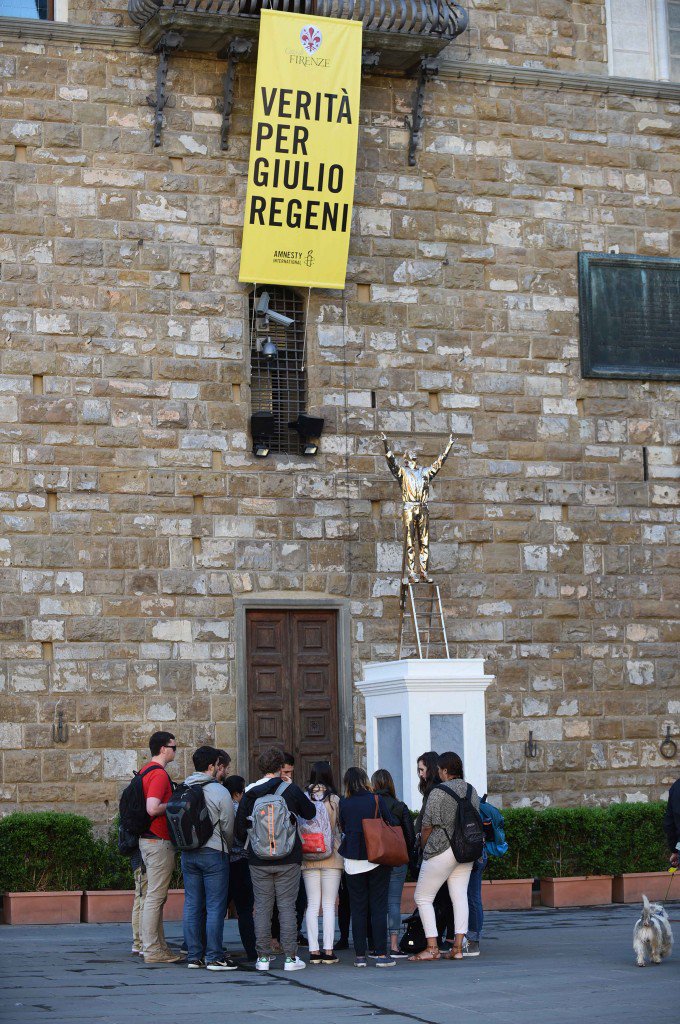Egypt
Four months after Regeni’s death, no answers and no justice
Europe has ceased demanding justice in the death of Giulio Regeni as it continues to ship arms to the Egyptian regime.

Four months have passed since Giulio Regeni disappeared a short distance from his apartment in the Dokki neighborhood, in Cairo, on a surreal evening; there was silence in the Egyptian capital, secured by the police and the army sent by the coup-maker president el-Sisi to stop the people from remembering their revolution. Regeni disappeared during Tahrir Square’s fifth anniversary, in the maze of state repression, a name among the names of disappeareds, forgotten in the oblivion of the jails.
Now, four months later, there isn’t even a shred of truth. From our leaders we often hear talk about national interest, explaining the lack of justice. Only the citizens are talking about Regeni. Nothing is heard from the governments, which, after a few tiffs (that’s the only way we can define the weak measures taken by Rome and Cairo’s angry reactions, in light of the actual Italian apathy), have put an end to the Regeni chapter. But to close the door on the Regeni affair means, also, to close the door on the sufferings endured by the Egyptian people, enslaved by a brutal regime worse than 30 years of Mubarak.
In spite of that, nothing has changed in the doctrine implemented by the president and by the Ministry of Internal Affairs: The police and the army continue to act like thugs. Detention orders against civil society leaders continue to be extended, but the detainees never go to trial. That’s the case of Ahmed Abdallah, manager of the Egyptian Commission for Rights and Freedoms, who’s been behind bars for over a month. And it’s the case for Atfal al-Shawarea (“Street Kids”), a satire group that scared the regime using a cellphone camera; for the journalists Badr and el-Sakka; and for the attorney Malek Adly.
And if it ever seems that some good news might appear from amid the oppression, the enthusiasm doesn’t last long: The 47 protesters arrested on April 25 and condemned to five years of jail, to whom the court of appeal of Giza had canceled the penalty on Tuesday, might remain in jail. Their attorneys asked for the €11,000 fine to be postponed and paid in installments, a request generally accepted by Egyptian courts. But not this time: Either they pay everything at once or they will remain another two months behind bars. The Nasserian party al-Karamah (“Dignity”) launched a fundraising campaign to find the money required to cover the 470 thousand Egyptian liras that will return freedom to the 47 protesters.
But for each challenge society launches, there are also those trying to block their gains, international backers deflecting threats to el-Sisi. That is, Europe. Europe sees the regime as necessary support in the “war on terror” and in blocking immigrants.
Amnesty International recently pointed out that Europe might be violating its own arms embargo by selling weapons to Cairo. It was imposed after the massacres in Rabaa al-Adweya and in Nahda, in which about 1,000 protesters were killed on Aug. 14, 2013, a month after the putsch against democratically elected President Morsi. Nonetheless, the European leaders don’t hide at all the mountain of military agreements they keep signing with Cairo. Let’s just think about the French president Hollande, who a month ago was flying to visit el-Sisi at the same time Rome was recalling its ambassador in protest. Among the agreements Holland signed was the sale of a military system and warships for €1 billion.
Nearly half of the E.U. member states, 12 out of 28, have never suspended the transfer of arms to Egypt, says Amnesty. In 2014 alone, there have been 290 licenses authorized for the export of military equipment (armored vehicles, heavy weapons, ammunitions, guns, surveillance technology), for a total of $6.77 billion. And, in spite the fact that Bulgaria is on the front line, it is the most powerful countries who continue in the business: Italy, France, Germany, Great Britain and Spain.
Brian Wood, head of Amnesty’s weapons control section, said Europe is supplying weapons that are probably feeding internal repression, contrary to the Weapons Trade Treaty that E.U. countries signed in December 2014. Italy, which should be seeking justice for Regeni, is among the suppliers: In 2014 Rome authorized 21 sales licenses for almost €34 million. In 2015, it sold 3,661 shotguns for €4 million. This year they already sold €73,000 in guns and revolvers. The United States is in on this, too, sending $1.3 billion in military funding each year to Cairo.
Egyptian Foreign Minister Shoukry responded to the report, saying that although he hadn’t read it, Amnesty’s claims were “exaggerated.” He said: “I have never seen the report attributing to the E.U responsibility for what happens in Egypt. Those weapons that Amnesty talks about have meaningfully contributed to the safety and the security of the armed forces and of the police.”
Originally published at http://ilmanifesto.info/quattro-mesi-dopo-su-giulio-e-silenzio-di-stato/ on 2016-05-27
